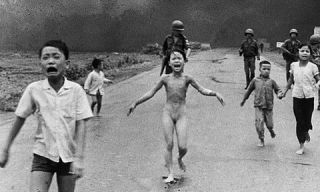Trauma
When Movie Trauma Mimics Historical Trauma
Ethical considerations for whether to bring trauma to life in a movie.
Updated July 2, 2024 Reviewed by Abigail Fagan
Key points
- Many war films are crafted with empathy and have helped individuals heal.
- Manufactured images can supersede actual memories or shape our perceptions.
- Audiences must choose what resonates with them, while at some point filmmakers need to trust their vision.

We know Alex Garland’s "Civil War," which imagines a modern domestic conflict taking over the United States, is only fiction, but it continues to resonate with Americans’ anxieties as we head into another polarized presidential election. The movie doesn't offer a clear explanation for the civil war, focusing instead on its occurrence and the profound impact it has on those involved. Technically, it's a masterfully executed film featuring convincingly realistic action scenes. Yet, therein lies the issue. The filmmakers painstakingly strive for realism in portraying war photographers yet prompting questions about accuracy as noted by Louie Palu in his Washington Post piece, "I'm a Photojournalist. 'Civil War' Gets War Photography Dangerously Wrong" and Greg Braxton and Carolyn Cole in their Los Angeles Times piece, "What 'Civil War' Gets Right and Wrong about Photojournalism, according to a Pulitzer Prize winner.” But it's not the accuracy I have trouble with. The “war” photos they capture are ethically troubling for me. They reference genuine horrors and historical events documented by real photographers, attempting to recreate them with virtuosity. This approach feels disrespectful to real trauma.
The Power of Depicting Trauma
As I have written previously, I don't oppose films depicting trauma. Horror movies, dramas, and comedies, in fact, often provide profound insights into trauma within fictional contexts. Such films can engender healing for the filmmaker and the audience since they are one step removed from historical reality, but emotionally true. My issue is that through its recreated war photos, "Civil War" purports to represent reality. At my son's Claremont McKenna graduation a few years back, the speaker was Phan Thi Kim Phúc, famously known as the “Napalm Girl,” photographed by Nick Ut.

Because of its raw, unfiltered reality, the Pulitzer Prize-winning image remains poignant and powerful, irrespective of one's familiarity with its backstory. Phan Thi Kim Phúc spoke of both resenting being captured in such vulnerability and the profound negative impact the photograph had on her life. On the other hand, she described how the photographer literally saved her life (after snapping his photo) and ultimately empowered her to advocate for peace and healing.
The Issue With Mimicking Historical Trauma
The crucial distinction here is the photo's authenticity. The trauma is real; Phan Thi Kim Phúc’s suffering was real. The photographer's actions had lasting consequences, both negative and positive. "Civil War" attempts to mimic this authenticity, urging viewers to marvel at the power of cinematic devices that seem to bring you a "real" photograph of an "actual" conflict, yet what is there feels contrived and ethically problematic.

Ethical Dilemmas in Other Films
I encountered a similar ethical quandary with James Cameron's 2009 blockbuster "Avatar." In one scene, the destruction of the tree and the loss of many Na'vi evoke a sense of witnessing a historical genocide akin to atrocities against Indigenous peoples or Jews. But those events were real, marked by enduring scars and generational trauma. Despite technical prowess akin to "Civil War," "Avatar" feels ethically hollow and problematic.
I reacted similarly to 2016’s "Jackie" and 2019’s "1917"—exquisitely crafted, yet why revisit such pain? When I asked my mother, a Jackie Kennedy admirer, if she wished to see the film, she replied (and I paraphrase), "Why would I want to subject myself to that again? It was horrible the first time when it happened.' And she was right—I'm not sure what we gained by bringing that day to life other than to show that we could.
Probably the most ethically problematic example: 2006's "Flight 93." Was this film an attempt to help our nation heal from 9/11 or a crass attempt to profit from misery? I'm not sure of the answer since I couldn't bring myself to see the film; so suspicious and put off was I by its raison d'etre.
Positive Depictions of Historical Trauma
Of course, the ethical considerations involved with whether to bring trauma to life or not present not a binary but a spectrum of answers. Many war films are crafted with empathy and have helped individuals heal. A physical trainer of mine who served in the Special Forces found 2001's "Blackhawk Down" profoundly resonant and therapeutic for processing his experiences in Somalia. One of my favorite films is the 2008 "Waltz with Bashir"—a friend told me no film captured his experience in the 1982 Lebanon War like that film. I also noted that this film uses animation like "Avatar." But think about the emotional truth and authenticity on display in "Bashir" versus "Avatar." The filmmakers in "Bashir" researched the real subject painstakingly. They even included actual—not recreated but actual—footage of the horrors that took place. How effective it was to move from animation to documentary footage at the end underscoring the reality of what had happened and underscoring the emotional journey that had taken place—from a distant, constructed relationship of past events to something present, raw, and emotional. Now, think of "Avatar." And, unfortunately, think of "Civil War." Is it worse to depict an actual historical event and all the associated traumas? Or worse to depict a fictionalized imitation, both referencing historical trauma and striving for authenticity, but at the same time sidestepping the ethical considerations that come with that authenticity?
The Long-Term Effects of Depicting Historical Trauma
I've previously cautioned in this blog against exploiting trauma for entertainment. Mastery of craft aside, just because something can be done doesn't mean it should, to paraphrase a line from "Jurassic Park." Susan Sontag, in her book Regarding the Pain of Others (2003), aptly warned about the power and peril of photography and how manufactured images can supersede actual memories or shape our perceptions. Similarly, whether good or bad, well done or not, these films risk becoming our memories or perceptions of historical events.
The Importance of Asking Questions
In my screenwriting and filmmaking, I try to keep key questions on the table: Why I am bringing trauma to life? Will it aid healing or inflict harm? In my current horror project, a producer's belief in its healing potential keeps me moving toward production, to not just bring horror to life because we can, but that we will bring horror to life for a purpose.
As founding director of Northwestern University's Pritzker Pucker Studio Lab for the Promotion of Mental Health via Cinematic Arts, I challenged my students to ask: What good comes of our work? How will it change the conversation about mental health or trauma? How does it help people heal (and the person healing might be the filmmaker themselves)? And yes, healing can occur via drama, comedy, or horror.
Now, as dean of the Media School at Indiana University, I am similarly asking our students to ponder, whether it be via journalism or filmmaking (and I love that our school encompasses so many approaches to the study and creation of media): What stories do we want to tell and why? What is their effect? What do we owe to our audiences?
And I challenge you, as audience members, to think of the same things as you watch movies and TV, especially movies like "Civil War" that reference actual events: Which depictions of trauma feel authentic? Is there a reason that the movie or TV show exists beyond profit? Is there healing? Why am I watching this?
Conclusion
Ultimately, these questions are personal journeys of introspection and decision-making. Audiences must choose what resonates with them, while at some point filmmakers need to trust their vision and beliefs, relinquishing doubt to infuse their creations with the magic of bringing characters to life.
Regardless of my own uncertainties, "Civil War" prompts a national reflection akin to how 1983’s "The Day After" compelled contemplation on nuclear war's impact. As November approaches, we must scrutinize our leaders and consider our collective response to the upcoming election. My hope is that through questioning, introspection, empathy, and understanding, the scenarios depicted in "Civil War" remain forever fictional.
References
Thanks to Jim Kelly for the Washington Post and Los Angeles Times references.




